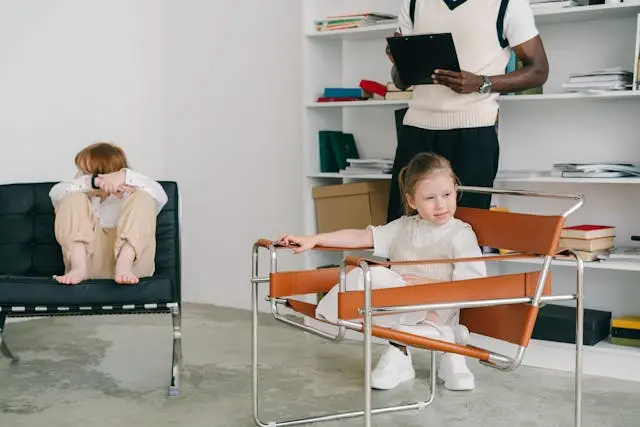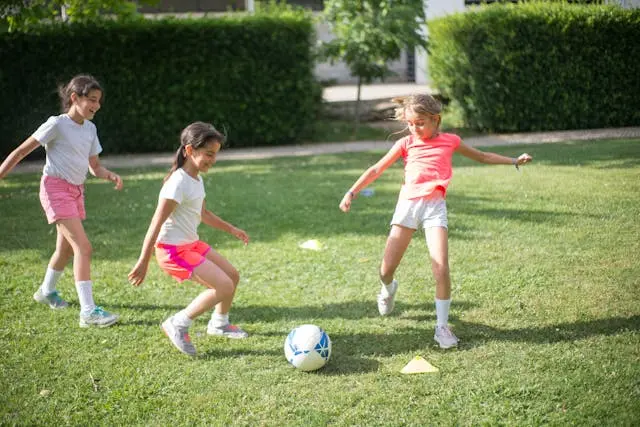How to Help Distracted Kids Focus- Effective Strategies for Parents
The article is developed in partnership with BetterHelp.
Have you ever asked your child to get dressed for school, only to find them still in pajamas, lost in play 20 minutes later? Or maybe you’ve sat with your child during homework time, only for them to spend all their focus on sharpening a pencil?
Most parents face the challenge of helping highly distractible kids stay on task from time to time. You can use enrichment activities to help keep your kids engaged, but at some point, they’ll have to sit quietly and work on potentially less-interesting things, like homework or cleaning their room.
This article will help you understand your child’s experience and provide tools to help them develop essential skills like organization, time management, and selective focus.
Why Kids Get Distracted

It’s common for children to get distracted, and there are many reasons for this, including:
- Boredom
- Tasks that are too easy or too hard
- Underdeveloped executive function skills
- Age-appropriate challenges such as impulsivity, a reduced ability to sustain attention, and limited motor control
- Navigating transitions like starting a new school, moving homes, or dealing with parental divorce
- Excitement over something, like a birthday party, summer break, or a new toy
- Stressful situations such as the death of a loved one
- Learning disabilities or ADHD
- Physical or mental health challenges such as anxiety or autoimmune disorders
In many cases, distraction isn’t a cause for concern. However, if your child is consistently and easily distracted, it could indicate underlying challenges. If your child struggles significantly with distractions, memory, or hyperfocus, it may be worth exploring inattentive ADHD, which is less recognized than hyperactive ADHD at BetterHelp.
How to Respond When Your Child Struggles to Pay Attention
When a child has difficulty focusing, they may have experienced negative labels or punitive measures like time-outs or grounding. These responses can hinder their growth and negatively impact their mental health and self-image. Instead, adopting a positive outlook can help your child develop a growth mindset and a can-do attitude. Here’s how you can better understand and support your child:
Understand That Focus is a Learned Skill
It’s easy to feel frustrated when your child won’t sit still or concentrate. However, constantly reminding them to pay attention can damage their self-esteem. Setting goals, focusing, and working on tasks are executive function skills that require time and patience to develop.
Children struggling with executive function aren’t being distracted on purpose. Instead of urging them to change, which may lead to frustration or breakdowns, offer them tools to better manage their time and learn how to focus.
Make Children Aware of Their Challenges
Once you understand your child’s attention challenges, it’s essential to share this with them. Explain that many children struggle with regulating their attention but can overcome these issues with hard work and helpful strategies.
You may also want to explain what executive functioning is, what it means to focus, and why the ability to focus is important. It’s also important to remind child with these challenges of their strengths, such as:
- Increased creativity
- Spontaneity
- Energetic
- The ability to think outside the box
- The opportunity to understand themselves better
- By overcoming challenges, they can become more resilient and self-confidence
It’s important that your child understands that their distraction means they have difficulties regulating their attention. This can make it more challenging in environments where they’re asked to sit still, concentrate, and listen quietly for much of the day. But that doesn’t mean they’re a bad kid or that it’s their fault that they have challenges with certain things.
Explain ADHD
If ADHD is responsible for your child’s difficulties with attention, you can explain their diagnosis using age-appropriate language. The organization, Children and Adults with Attention-Deficit/Hyperactivity Disorder (CHADD), gives the following definition: “ADHD means your brain enjoys things that are new and exciting, but it may be harder to learn things you have to repeat a lot, like math facts.”
Communicate Your Desire to Help
Meet your child where they’re at. Let them know that you understand or want to understand their experience, and that you are there to help them make it easier to navigate. For example, if your child often complains that their classmates distract them, you might say, “You were saying that you’re getting distracted by your classmates at school this week, right? Let’s think of some ways that we could address that challenge.”
Children with executive function challenges often internalize guilt or shame about their difficulty focusing. Supporting them, instead of criticizing them, is important for developing a growth mindset.
Helping Your Child with Executive Function Challenges
The following are some specific tools and strategies you can use to help your child improve their attention regulation:
Develop SMART goals
SMART goals are specific, measurable, attainable, relevant, and time-based. These structured goals can help people set achievable goals in the short and long term. For example, a smart goal to improve organization skills may sound like, “Every evening this week, I will prepare a five-item to-do list for the following day.”
Reduce Distractions
Reducing distractions can help children focus. For example, you should consider turning off phone notifications, turning off the television, and discussing whether blocking social media applications during schoolwork hours could be beneficial.
Invest in a Planner
Physical planners or digital tools like Google Calendar can help children stay organized. Work with them to color-code activities, like using blue for homework, orange for extracurriculars, and green for chores.
Organize Their Space
Children who are easily distracted often find it difficult to keep things organized. To help make it easier for them to keep their room tidy, consider the following tips suggested by a professional organizer whose child has ADHD:
- Work together to decide where things should go, and then create labels together to help keep things organized.
- Put each category of item in its own container. For example, put socks in one container, pajamas in a different container, and underwear in yet another.
- Declutter and donate unused items.
- Color code things like clothing, books, and toys.
- Use clear bins when possible.
- Use closet space, room dividers, and other tools effectively to reduce distractions.
- Store out-of-season shoes and clothing in another room.
- Create “zones” like a study zone, sleep zone, play zone, and art project zone.
Involving your child in the process can boost their self-esteem, encourage creativity, and help them create a space they’re proud of.
Create a Classroom Strategy
By choosing a seat in the front of the classroom and away from windows or noisy peers, kids can reduce distractions. You should also inquire with the school about accommodations, like noise-canceling headphones or earbuds, to reduce distractions during quiet time and tests.
Try Time-Management Techniques
Time-management strategies like the Pomodoro Technique can help kids break their time into “focus time” and “break time.” Here’s how to try it:
- Help your child pick a single task and find a quiet space away from distractions.
- Set a timer for 15-30 minutes. When it goes off, your child has completed one Pomodoro.
- Take a 5-10 minute break after each Pomodoro.
- Repeat for a total of four Pomodoros.
- After four Pomodoros, take a longer break (20-30 minutes).
The Pomodoro Technique is great for kids who procrastinate or struggle to start tasks. The short work intervals remind them they won’t be stuck working forever, making it easier to get started.
Track Pomodoros daily and celebrate milestones. For example, go out for ice cream when your child reaches 50 total Pomodoro sessions.
Introduce Changes Gradually
It can be tempting to implement multiple changes at once to help your child. However, introducing changes slowly can reduce the likelihood of overwhelming them. Remember that developing executive function skills is a marathon, not a sprint.
Takeaway
Many children get distracted, and while it can be frustrating for adults, it’s crucial to avoid reprimanding them. When given the right tools and opportunities to learn skills like organization, time management, and attention regulation, children can become more attentive listeners and gain confidence in their ability to set and achieve goals.







